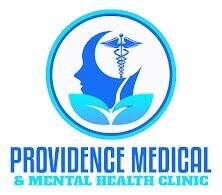ADHD Specialist

ADHD
Attention-deficit hyperactivity disorder (ADHD) is best known as a condition that affects children, but for one-third of them, the condition continues into adulthood. At Providence Medical & Mental Health Clinic, Dr. Esther Eke-Huber, PhD, APRN, ANP-C, PMHNP-BC, helps children, teens, and adults overcome the challenges of ADHD and learn the skills they need to succeed in life. If you or your child struggle with ADHD, call the office in Houston, Texas, or book an in-person or telemedicine appointment online today.
What is ADHD?
ADHD affects your child’s ability to focus and regulate their behaviors and emotions. Though the signs of ADHD appear before the age of 12, the diagnosis may not occur until later. The typical age range of ADHD patients at Providence Medical & Mental Health Clinic is 10-17.
Everyone occasionally feels hyperactive or finds it hard to listen and pay attention. With ADHD, these problems happen on a daily basis, and they’re severe enough to interfere with daily life. ADHD affects the ability to make friends, do well in school, and achieve success at work.
What are the symptoms of ADHD?
The symptoms depend on the type of ADHD. There are two primary types of ADHD, inattentive and hyperactive-impulsive. But many people have combined ADHD, which means they have symptoms from both types:
Primarily inattentive ADHD
Inattentive ADHD causes symptoms like:
- Not noticing details
- Not paying attention
- Getting distracted
- Making careless mistakes
- Not following instructions
- Struggling to complete tasks
- Forgetting to do chores
- Having poor organizational skills
People with inattentive ADHD may seem lost in their own world as they don’t listen well and miss what others say.
Primarily hyperactive-impulsive ADHD
Symptoms of hyperactivity and impulsivity include:
- Being unable to sit still (fidgeting or squirming)
- Frequently talking
- Not waiting to take turns
- Interrupting conversations and activities
- Staying constantly active
- Struggling to control emotions
Children with ADHD often have poor impulse control, leading to problems with anger and other difficult behaviors.
How is ADHD treated?
During your first appointment at Providence Medical & Mental Health Clinic, your provider talks with you and, depending on your age, your parents or caregivers. Your provider learns about your concerns, as well as your history and background, so they can develop a customized treatment plan.
ADHD treatment typically includes psychotherapy and/or medication. When needed, your provider refers you to other specialists.
Psychotherapy
Therapy focuses on the behavioral and emotional skills that ADHD affects. During therapy, children learn to manage their behavior and how to socialize and pay attention.
At every age, therapy helps you improve the skills you need to succeed in daily life. For example, you may need help learning how to organize your time or control anger.
Medications
Stimulant medications boost the brain chemicals needed to improve attention and regulate behaviors. However, if you don’t improve with or can’t tolerate stimulant medications, your provider may prescribe a non-stimulant medication.
If you or your child need help with ADHD, call Providence Medical & Mental Health Clinic or book an appointment online today.
